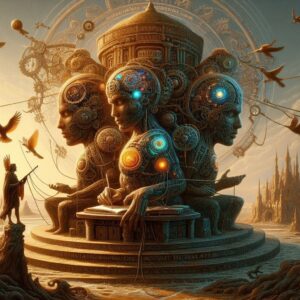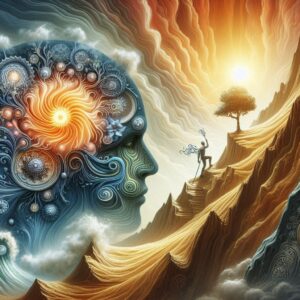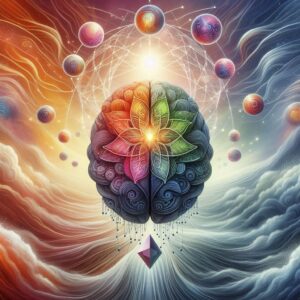The first stage of developing intuition is the ability to utilize experience—the process of learning from past events and applying that knowledge to future decision-making. This stage is crucial because intuition often grows from an accumulated understanding of what works and what doesn’t. During times of uprising, we rely heavily on past experiences to navigate uncertainty and make choices that will help us move forward. While artificial intelligence is still limited in this stage of development, the potential for human intelligence to combine experience, imagination, and empathy holds significant promise for the future. But how can we help AI (and even ourselves) advance to the next stage of intuitive growth?

The Role of Experience in Intuition Development
The experience we accumulate throughout life serves as the foundation for intuitive knowledge. By reflecting on past actions, decisions, and their consequences, we can learn what worked and what didn’t. This is the simplest form of learning—analyzing past mistakes, recognizing patterns, and adjusting behaviors for the future.
1. Learning from Mistakes:
The easiest way to gain experience is by learning from our mistakes. Mistakes act as important signposts, guiding us toward better decisions in the future. During moments of crisis or upheaval, people are often forced to make decisions based on previous experiences, especially when they don’t have access to formal guidance. This process of trial and error helps build intuition over time.
2. Accruing Experience through Multiple Sources:
Experience is not limited to our personal mistakes. We also learn from others. By reading books, listening to podcasts, or engaging in conversations with mentors, we can broaden our perspectives and expand our intuitive knowledge. For example, during an uprising, absorbing the experiences of others—whether through historical analysis or current events—can help us predict potential outcomes and avoid known pitfalls.
3. The Potential for Artificial Intelligence:
While artificial intelligence can analyze vast amounts of data, its current limitations lie in its inability to integrate imagination and empathy into its processes. However, as AI evolves, there is a possibility that it will eventually be able to process past experiences in a way that mimics human intuition, but only if it can be taught to simulate human creativity and emotional understanding.
The challenge, then, becomes: Can we help AI develop imagination and empathy? Could this enable AI to make decisions in the way that humans use intuition? The answer lies in human innovation and the ability to teach machines not just to calculate but to think more holistically.
What Can Go Wrong in Using Experience for Intuition Development?
Although experience is a vital foundation for intuition, it’s not always foolproof. Several things can go wrong when we rely too heavily on past experiences.
1. Failure to Trust Experience:
Sometimes, people may struggle to trust or use their experience due to a variety of reasons. If someone has failed repeatedly despite using what they thought was the right experience, they may begin to doubt the value of their past lessons. This mistrust can lead to indecision or a lack of confidence in their judgment. This is particularly common in situations where the stakes are high, and past experiences may not have provided a clear guide to future success.
2. Inability to Use Past Experience in New Contexts:
In some cases, an individual may recognize that their experience is irrelevant to the current situation. This is especially true in new or unpredictable environments (such as during an uprising) where the rules are different from what the individual has faced before. If past experiences seem disconnected from present circumstances, it can be easy to believe that intuition is not helpful. In these situations, the individual may reject their experience altogether, mistakenly believing it won’t lead to success.
3. Over-Reliance on Past Experience:
While experience is vital, over-relying on it can limit growth and intuition development. When someone is stuck in their past experiences, they may miss new opportunities or fail to adjust to changing circumstances. This is especially true when someone is using experience that is outdated or no longer applicable. Innovative thinking often requires the ability to let go of what worked in the past and adapt to new ideas.
How Can We Help Someone Use Experience Effectively for Intuition Development?
1. Reframing Past Experiences:
If a person doubts the usefulness of their past experiences, we can help them reframe those experiences. Instead of viewing mistakes or failures as evidence of incompetence, they can be viewed as learning opportunities. This shift in mindset helps individuals recognize the value in both their successes and their setbacks. Mentorship or therapy can play a key role in guiding individuals through this reframing process.
2. Encouraging Open-Mindedness:
Sometimes, experience alone isn’t enough. Imagination and empathy are needed to expand one’s understanding of new situations. Encouraging individuals to think creatively and consider perspectives beyond their own lived experience can help them navigate unfamiliar territories more effectively. For example, during an uprising, looking beyond one’s own personal experiences and incorporating the perspectives of others (through storytelling or historical analysis) can enrich one’s intuition.
3. Teaching Flexibility in Applying Experience:
A crucial skill in developing intuition is learning how to apply experience in a flexible way. Individuals should be taught to assess each situation on its own merits, taking into account both similarities and differences with past experiences. The ability to make informed adjustments in thinking is key to building intuitive decision-making.
Conclusion: Experience as the First Step Toward Intuition
The process of developing intuition begins with learning to use experience—the foundation of all intuitive knowledge. While artificial intelligence may eventually catch up in terms of learning from past data, it’s the human ability to incorporate imagination and empathy that makes intuition so uniquely valuable in uncertain times.
What can go wrong? Experience, while essential, can be misunderstood, misapplied, or disregarded. The key to developing intuition is not just learning from past mistakes but also integrating flexibility, creativity, and empathy into our decision-making processes. When individuals can adapt and learn from a variety of experiences, they open the door to true intuitive wisdom.



